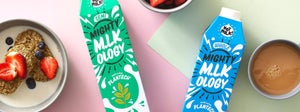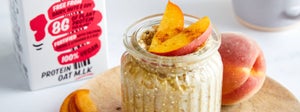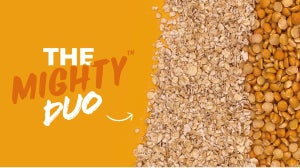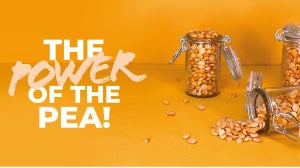
Bottom Line: Are Mighty Oat M.lks Better for the Environment?
You love the taste and the health benefits of oat milk.But is oat milk better for the environment?
It’s a good question. Some people are even saying that oat milk isn’t that sustainable or good for the planet. Of course, the first thing to ask is better than what? Better than cow’s milk? Better than other plant-based, dairy-free alt m.lks? Let’s have a look at some scientific research and key facts.
Plant-based milk substitutes or alternatives, often called alt m.lks, are usually lumped together into one big group. But they’re not all the same. They have very different sources and they’re made a variety of ways. There’s soy milk, potato milk, hemp milk, pea milk, almond milk, hazelnut milk, cashew milk and of course, oat milk.
Better for the environment than other dairy-free milk alternatives?
As you can see, dairy-free milk alternatives can be produced from a range of crops. But some are more harmful to the environment than others. Almond and rice milks needs lots of water for instance. Almonds alone need more water than any other dairy alternative, consuming 130 pints of water to produce just a single glass of almond milk.
Coconut trees only grow in tropical climates. So the western demand for coconut milk has led to a big rise in deforestation and the exploitation of workers in poorer countries. And it’s not just coconut milk that’s done this. Large areas of the Amazon have been burned to make way for soy farms, and the soy goes into alt-milk as well as cattle feed.
Oats, on the other hand tend to be grown in cooler climates such as the northern US, Canada, and Europe. Therefore, oats are not associated with deforestation in developing countries or the exploitation of poorly-paid workers.
Better for the environment than cow’s milk?
So how does oat milk’s environmental impact compare with cow’s milk’s? This is where dairy milk has a big negative impact. That’s because it’s based on raising cows – and lots of them. This takes more water, and more land to grow animal feed to make the cows grow. The loss of land also leads to more a bigger impact on biodiversity.
In addition, massive numbers of cows mean massive amounts of methane being pumped into the atmosphere. This has a global warming potential 28 to 34 times greater than that of CO2. In fact, a study by Oxford University in 2018 found that one glass of cow’s milk has a carbon footprint three times bigger than plant-based milk. It uses up 120 litres of water and needs large amounts of land.
Research carried out by MONDRA backs this up. They’re an independent organisation working hard to create a sustainable global food system. MONDRA looked into four types of environmental impact when producing cow’s milk compared with our four MIGHTY oat drinks –
Impact on land use – cow’s milk vs MIGHTY oat m.lks
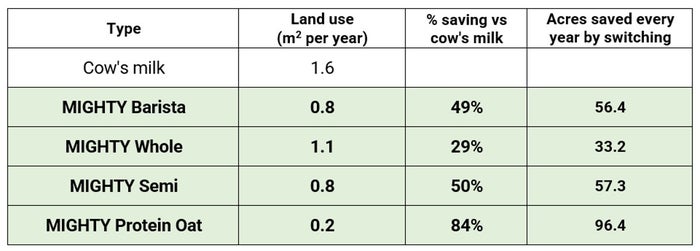
Switching to protein oat can save roughly 64 football pitches worth of land used per person per year!
Impact on water use – cow’s milk vs MIGHTY oat m.lks
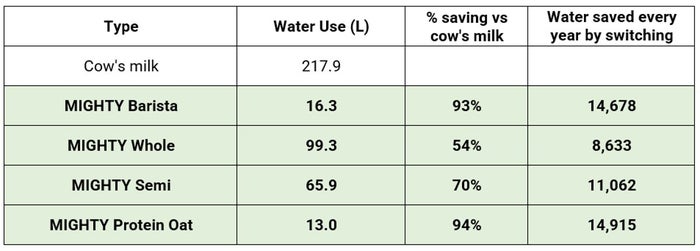
This means you could save up to 149 baths worth of water by switching (to protein oat). Which means less less energy required to treat wastewater, reduced requirements during periods of drought and also helps keep our waterways healthy.
Impact on CO2 emissions – cow’s milk vs MIGHTY oat m.lks
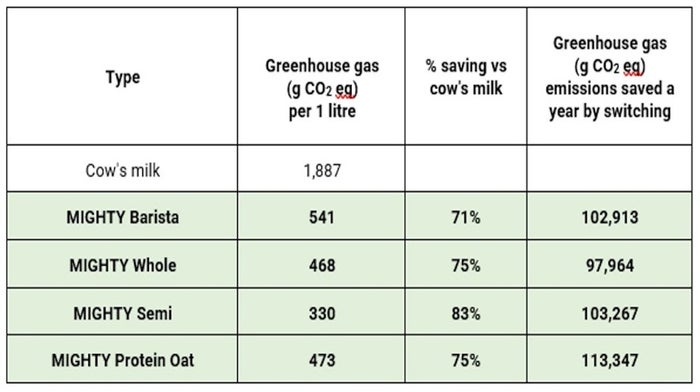
Impact on biodiversity loss – cow’s milk vs MIGHTY oat milks

Britain’s favourite dairy-free alt milk
All of this might be why oat milk is now the country’s best-selling dairy milk alternative. More than one in three British people now drink plant-based milk, with oat milk being the most popular. In fact, you guys spent £146 million on oat drinks in 2020, as part of a total market worth £400 million a year.
The research carried out by market research company Mintel questioned 2,000 people aged 16 and over. They discovered that of those aged between 25 to 44, almost 44% now drink plant-based milk.
So how much could you save every year in terms of actual harm to the environment and biodiversity loss by switching to MIGHTY?

Related Articles



